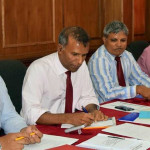Parliament today passed the Goods and Services Tax (GST) bill, a key piece of legislation in the government’s 18-bill economic reform package, with 40 votes in favour and 30 against.
Of the 71 MPs present and voting, only one abstained. Jumhooree Party Leader Gasim Ibrahim and Independents Ali Mohamed, Ahmed ‘Sun Travel’ Shiyam, Mohamed Zubair, Ahmed Amir and ‘Kutti’ Mohamed Nasheed joined the ruling Maldivian Democratic Party (MDP) in voting for the bill.
After today’s sitting, parliament breaks for a one-month recess before returning in October for this year’s final session.
The new sales tax will come into force a month after the legislation is ratified by the President and published in the government’s gazette.
While the GST is set at 3.5 percent this year, it will rise to six percent from January 2012. Utilities, health services, public education, telecom services, petrol, cooking oil and diesel are among items exempt from the tax.
The GST will be applicable to businesses whose total goods and services offered over a year exceeds Rf 1 million (US$65,000).
In addition, the legislation will raise the existing Tourism Goods and Services Tax (T-GST) to six percent in January 2012 and eight percent in January 2013.
“Undue burden”
During today’s final debate, opposition MPs argued that local businesses would not have enough time to prepare to pay the GST and that necessary improvements in records keeping would be an “undue burden” on small businesses.
Prominent businessmen and resort owners, such as Jumhooree Party (JP) Leader Gasim Ibrahim and Independent MP Ahmed ‘Sun Travel’ Shiyam, criticised the bill and suggested that the introduction of the GST should be delayed. Both MPs however voted for the bill.
In a booklet handed out to media yesterday, the main opposition Dhivehi Rayyithunge Party (DRP) noted that the General GST would affect small businesses such as cornershops, cafes and teashops, which would “need a lot of preparation” to maintain accounts, install “modern computer systems and hire accountants” as well as provide customer’s statements showing the GST percentage.
Morever, taxing “total value of business transactions” would not be possible with GST at zero percent for some items.
Considering the potential “administrative confusion” and the country’s heavy reliance on imports, the DRP argues that levying a customs duty at the entry point to the country was more effective.
“Eid gift”
Speaking at a press conference after today’s vote, MP Ibrahim ‘Ibu’ Mohamed Solih, Maldivian Democratic Party (MDP) parliamentary group (PG) leader, noted that as a result of amendments proposed by opposition MPs to exempt cooking oil, petrol, diesel and telecom services from the GST, the government would face a projected revenue shortfall of Rf167 million (US$10.8 million) this year and Rf274 million (US$17.7 million) in 2012.
“Budgeted funds for development projects are going to be lost because of [the amendments],” he said. “As a consequence, the government will have to either push back or revise some development projects.”
MP Mohamed Aslam, deputy PG leader and chairman of the Economics Committee, said that the passage of the GST bill was “an Eid gift to the Maldivian people.”
Aslam explained that the GST alone would account for Rf2.7 billion (US$179 million) in tax revenue for 2012.
Deputy PG leader Ahmed Sameer meanwhile accused opposition MPs of “trying to cut off sources of income for the government” while supporting bills that would increase expenditure in a bid to sabotage the government’s efforts to balance the budget.
On proposed amendments to the Export-Import Act to excise and reduce import duties for most items, Ibu Solih said that the amendment bill had been reviewed by committee and sent to the Speaker.
“I think it was not included in today’s agenda because there was no time. It’s an administrative matter that is up to the Speaker,” he said.
A source at the President’s Office told Minivan News yesterday that the GST was intended to replace custom duties and crossover would see the same commodities being taxed twice.
Ibu Solih explained that the party expected the amendment bill to be passed in the first week of the next session before the GST is collected: “So there would be only two or three days difference [between enactment of the laws] and we believe it would become adjusted,” he said.
The MP for Hinnavaru also disputed a claim by the DRP that the government refused to accept a suggestion to delay the implementation of the tax by three months.
Following “technical level” consultations with the government after President Mohamed Nasheed signalled willingness to incorporate changes recommended by the opposition, the DRP however declared it would issue a three-line whip for its members to vote against the GST bill.
The announcement was made after a number of DRP MPs voted last week to approve the bill with amendments brought by the full Majlis committee.
“We have said that we will consider amendments proposed by opposition parties, but even up to the last moment, no opposition MP spoke to us about possible amendments,” Ibu Solih said, adding that the MDP proposed “sitting down at the table to discuss any changes.”
However the DRP did not discuss delaying the enactment of the GST legislation before submitting an amendment to the Majlis floor during the final committee stage.
“I believe if we are to discuss between two parties to reach a decision, the discussions should take place before the amendment is proposed,” he said.
“We sat together and brought amendments to the Export-Import Act and took the GST bill together with MPs from both sides at the table. It passed the sub-committee after both sides agreed. Because of the amendments to the Export-Import Act, government revenue will be reduced substantially. We were able to agree that we’d make up for it with the GST in a fair manner. But when it is proposed to reduce revenue to the state from both bills, we can’t support that.”






Politics aside, one cannot but agree that replacing customs duties with a VAT at the point of sale is the ideal alternative.
However, a reasonable time-frame would have been desirable.
In a manner of speaking, the ensuing administrative confusion will stretch out the time-frame anyhow.
I hear tell that opposition leader Abdulla Yamin voted FOR the GST bill as well. Wonder if that's true.
At last the government is able to introduce a tax structure in Maldives. Now it is up to politician to increase or decrease the taxes. I believe now Maldivian politicos will be forced to campaign on tax issues rather than spiritual and religious issues.
Maybe Abdulla Yameen was corrupted during his half-brother’s hay days. Now, he too realizes that to be in politics he needs to show that he is working for the good of mass population.
Probably he would have voted in favor of taxation bills.
"Maybe Abdulla Yameen was corrupted during his half-brother’s hay days. Now, he too realizes that to be in politics he needs to show that he is working for the good of mass population."
If you belive that, then you must believe in black magic, voodoo and all forms of mysticsm. He ain't gonna change his spots, mr ahmed, however, one may wish. He's one crooked son of a bitch, that'll live his days just the way he his.
It's all good, the only question is- are we ready?
No proper book keeping practices by many/ most businesses=no accurate figures=non compliance=no consequences as everyone is in the same boat=tax dodging free for all =defeated purpose of the bill.
Although I s'pose we have to start somewhere.
tsk tsk:
I am not so sure if a VAT/GST is such an 'ideal' alternative to import duty. I would rather have no import duty and no GST as well.
You do realise that VAT is applied at each point in the the whole supply chain, such as when importer->whole saler->retailer->customer. And that is applied to the 'value added part'. Now I don't know how the bill is framed, but normally the cost of administerign this tax system is born buy the businesses and paid by customer. So I think it tends to be regressive with respect to income.
I support introduction of GST and getting rid of import duty (it should be retained for some luxury items like cars etc). However, I feel the proposed implementing time line is too short and impractical! Businesses need time to prepare for this!
So the business will have to pay taxes, fine. But what about the landlords, would they have to create businesses to collect their money and pay the taxes as well?
Somebody has give them "LEGO" so they play with them instant with people. Many changes but nothing is changing ! leason, rules done...oh no.. lets change like that...o no... lets change again.... are they ruling the country or what.
NOBODY of this politician and ordinary people like all MDP's lookink for they own people (young ones) salary 3500mrf a waiter howmany hours he is working? shame on your politics , on the street how accident, politics taking more money - more motorbikes are imported!! taking money , making sales lucrative! ye ye i am okay who cares others DHO. you guys wake up!! increasing tax , why? ooo the people has to pay, mmm they are ungry , how many MDP fighter are healthy? check it out!! wake up, now you have also this beart people , behind they are reach, IPAD , thinking about poor people. YOU have to work toghether. be hones be maldivian!